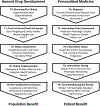Artificial Intelligence and Personalized Medicine
- PMID: 31209850
- PMCID: PMC7580505
- DOI: 10.1007/978-3-030-16391-4_11
Artificial Intelligence and Personalized Medicine
Abstract
The development of high-throughput, data-intensive biomedical research assays and technologies has created a need for researchers to develop strategies for analyzing, integrating, and interpreting the massive amounts of data they generate. Although a wide variety of statistical methods have been designed to accommodate 'big data,' experiences with the use of artificial intelligence (AI) techniques suggest that they might be particularly appropriate. In addition, the results of the application of these assays reveal a great heterogeneity in the pathophysiologic factors and processes that contribute to disease, suggesting that there is a need to tailor, or 'personalize,' medicines to the nuanced and often unique features possessed by individual patients. Given how important data-intensive assays are to revealing appropriate intervention targets and strategies for treating an individual with a disease, AI can play an important role in the development of personalized medicines. We describe many areas where AI can play such a role and argue that AI's ability to advance personalized medicine will depend critically on not only the refinement of relevant assays, but also on ways of storing, aggregating, accessing, and ultimately integrating, the data they produce. We also point out the limitations of many AI techniques in developing personalized medicines as well as consider areas for further research.
Keywords: Artificial intelligence; Big data; Clinical trials; Personalized medicine.
Figures


Similar articles
-
Future Direction for Using Artificial Intelligence to Predict and Manage Hypertension.Curr Hypertens Rep. 2018 Jul 6;20(9):75. doi: 10.1007/s11906-018-0875-x. Curr Hypertens Rep. 2018. PMID: 29980865 Review.
-
Big Data, Machine Learning, and Artificial Intelligence to Advance Cancer Care: Opportunities and Challenges.Semin Oncol Nurs. 2023 Jun;39(3):151429. doi: 10.1016/j.soncn.2023.151429. Epub 2023 Apr 20. Semin Oncol Nurs. 2023. PMID: 37085405
-
Artificial intelligence: A joint narrative on potential use in pediatric stem and immune cell therapies and regenerative medicine.Transfus Apher Sci. 2018 Jun;57(3):422-424. doi: 10.1016/j.transci.2018.05.004. Epub 2018 May 9. Transfus Apher Sci. 2018. PMID: 29784537 Review.
-
Transforming personalized chronic pain management with artificial intelligence: A commentary on the current landscape and future directions.Exp Neurol. 2024 Dec;382:114980. doi: 10.1016/j.expneurol.2024.114980. Epub 2024 Sep 29. Exp Neurol. 2024. PMID: 39353544 Review.
-
Artificial Intelligence in Precision Cardiovascular Medicine.J Am Coll Cardiol. 2017 May 30;69(21):2657-2664. doi: 10.1016/j.jacc.2017.03.571. J Am Coll Cardiol. 2017. PMID: 28545640 Review.
Cited by
-
Harnessing Corneal Stromal Regeneration for Vision Restoration: A Comprehensive Review of the Emerging Treatment Techniques for Keratoconus.Cureus. 2024 Sep 21;16(9):e69835. doi: 10.7759/cureus.69835. eCollection 2024 Sep. Cureus. 2024. PMID: 39435192 Free PMC article. Review.
-
A Concept Analysis on the Use of Artificial Intelligence in Nursing.Cureus. 2021 May 5;13(5):e14857. doi: 10.7759/cureus.14857. Cureus. 2021. PMID: 34113496 Free PMC article. Review.
-
Implementation of artificial intelligence and non-contact infrared thermography for prediction and personalized automatic identification of different stages of cellulite.EPMA J. 2020 Feb 7;11(1):17-29. doi: 10.1007/s13167-020-00199-x. eCollection 2020 Mar. EPMA J. 2020. PMID: 32140183 Free PMC article.
-
Artificial intelligence in neuro-oncology: methodological bases, practical applications and ethical and regulatory issues.Clin Transl Oncol. 2025 May 22. doi: 10.1007/s12094-025-03948-4. Online ahead of print. Clin Transl Oncol. 2025. PMID: 40402414 Review.
-
Ethical Integration of Artificial Intelligence in Healthcare: Narrative Review of Global Challenges and Strategic Solutions.Cureus. 2025 May 25;17(5):e84804. doi: 10.7759/cureus.84804. eCollection 2025 May. Cureus. 2025. PMID: 40568260 Free PMC article. Review.
References
-
- Russell S and Norvig P, Artificial Intelligence: A Modern Approach (3rd Edition). 3rd ed 2009, Carmel, Indiana: Pearson.
-
- Mahmud M, et al., Applications of Deep Learning and Reinforcement Learning to Biological Data. IEEE Trans Neural Netw Learn Syst, 2018. 29(6): p. 2063–2079. - PubMed
-
- Webb S, Deep learning for biology. Nature, 2018. 554(7693): p. 555–557. - PubMed
-
- Fleming N, How artificial intelligence is changing drug discovery. Nature, 2018. 557(7707): p. S55–S57. - PubMed
-
- Committee to Review the Clinical and Translational Science Awards Program at the National Center for Advancing Translational Sciences; Board on Health Sciences Policy; Institute of Medicine; Leshner AI TS, ed. The CTSA Program at NIH: Opportunities for Advancing Clinical and Translational Research. The National Academies Collection: Reports funded by National Institutes of Health. 2013, National Academies Press: Washington, DC. - PubMed
MeSH terms
Grants and funding
LinkOut - more resources
Full Text Sources

